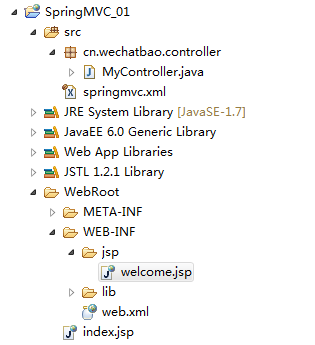《SpringMVC从入门到放肆》八、SpringMVC注解式开发(基本配置)
上一篇我们结束了配置式开发,配置式开发目前在企业中用的并不是很多,大部分企业都在使用注解式开发,所以今天我们就来学习注解式开发。所谓SpringMVC注解式开发是指,处理器是基于注解的类的开发方式。对于每一个定义的处理器,无需在配置文件中逐个注册,只需在代码中通过对类与方法的注解,便可完成注册。
一、注册组件扫描器
这里说的组件即处理器,需要指定处理器所在的基本包。
<?xml version="1.0" encoding="UTF-8"?> <beans xmlns="http://www.springframework.org/schema/beans" xmlns:xsi="http://www.w3.org/2001/XMLSchema-instance" xmlns:context="http://www.springframework.org/schema/context" xmlns:aop="http://www.springframework.org/schema/aop" xmlns:tx="http://www.springframework.org/schema/tx" xmlns:mvc="http://www.springframework.org/schema/mvc" xsi:schemaLocation="http://www.springframework.org/schema/beans http://www.springframework.org/schema/beans/spring-beans.xsd http://www.springframework.org/schema/context http://www.springframework.org/schema/context/spring-context.xsd http://www.springframework.org/schema/aop http://www.springframework.org/schema/aop/spring-aop.xsd http://www.springframework.org/schema/tx http://www.springframework.org/schema/tx/spring-tx.xsd http://www.springframework.org/schema/mvc http://www.springframework.org/schema/mvc/spring-mvc.xsd"> <!-- 注册组件扫描器 --> <context:component-scan base-package="cn.wechatbao.controller"></context:component-scan> </beans>
二、第一个注解式Demo
1:Controller
package cn.wechatbao.controller; import javax.servlet.http.HttpServletRequest; import javax.servlet.http.HttpServletResponse; import org.springframework.stereotype.Controller; import org.springframework.web.bind.annotation.RequestMapping; import org.springframework.web.servlet.ModelAndView; @Controller public class MyController { @RequestMapping("/my.do") public ModelAndView first(HttpServletRequest request, HttpServletResponse response) throws Exception { ModelAndView mv = new ModelAndView(); mv.addObject("message", "第一个注解式开发程序"); mv.setViewName("/WEB-INF/jsp/welcome.jsp"); return new ModelAndView(""); } }
2:JSP页面(welcome.jsp)
<%@ page language="java" import="java.util.*" pageEncoding="UTF-8"%> <!DOCTYPE HTML PUBLIC "-//W3C//DTD HTML 4.01 Transitional//EN"> <html> <head> <title>SpringMVC1</title> </head> <body> ${message } </body> </html>
3:完整的项目结构

三、命名空间的配置
一般情况下,我们开发时,一个Controller类就是一个模块,而里面的所有处理器方法就是该模块的不同业务功能。这个时候,我们Controller与Controller之间就要用路径来区分开来。以表示不同的业务模块。这个时候,只需要在类上再加上@RequestMapping("/test")注解就OK了。
完整的类如下:
package cn.wechatbao.controller; import javax.servlet.http.HttpServletRequest; import javax.servlet.http.HttpServletResponse; import org.springframework.stereotype.Controller; import org.springframework.web.bind.annotation.RequestMapping; import org.springframework.web.servlet.ModelAndView; @Controller @RequestMapping("/test") public class MyController { @RequestMapping("/first.do") public ModelAndView first(HttpServletRequest request, HttpServletResponse response) throws Exception { ModelAndView mv = new ModelAndView(); mv.addObject("message", "第一个注解式开发程序方法一"); mv.setViewName("/WEB-INF/jsp/welcome.jsp"); return mv; } @RequestMapping("/second.do") public ModelAndView second(HttpServletRequest request, HttpServletResponse response) throws Exception { ModelAndView mv = new ModelAndView(); mv.addObject("message", "第一个注解式开发程序方法二"); mv.setViewName("/WEB-INF/jsp/welcome.jsp"); return mv; } }
四、请求中通配符的使用
在实际开发的过程中,我们可能会遇到请求中的方法开头或结尾是固定的,其它字符是可变的,比如:
http://localhost:8080/SpringMVC/usermanager/user-add.do
http://localhost:8080/SpringMVC/usermanager/user-edit.do
假设上面URL中usermanager是模块名(也就是我们说的命名空间),user-add.do和user-edit.do是具体的请求。但是添加和修改我们完全可以用一个处理器方法来解决。这个时候用通配符就简单多了。其实配置起来也特别简单,只需要在处理器方法上面的注解里加*就可以了。如下
@RequestMapping("/user-*.do")
public ModelAndView userAddOrUpdate(HttpServletRequest request,
HttpServletResponse response) throws Exception {
ModelAndView mv = new ModelAndView();
mv.addObject("message", "用户的添加或修改功能");
mv.setViewName("/WEB-INF/jsp/welcome.jsp");
return mv;
}



 上一篇我们结束了配置式开发,配置式开发目前在企业中用的并不是很多,大部分企业都在使用注解式开发,所以今天我们就来学习注解式开发。所谓SpringMVC注解式开发是指,处理器是基于注解的类的开发方式。对于每一个定义的处理器,无需在配置文件中逐个注册,只需在代码中通过对类与方法的注解,便可完成注册。
上一篇我们结束了配置式开发,配置式开发目前在企业中用的并不是很多,大部分企业都在使用注解式开发,所以今天我们就来学习注解式开发。所谓SpringMVC注解式开发是指,处理器是基于注解的类的开发方式。对于每一个定义的处理器,无需在配置文件中逐个注册,只需在代码中通过对类与方法的注解,便可完成注册。

